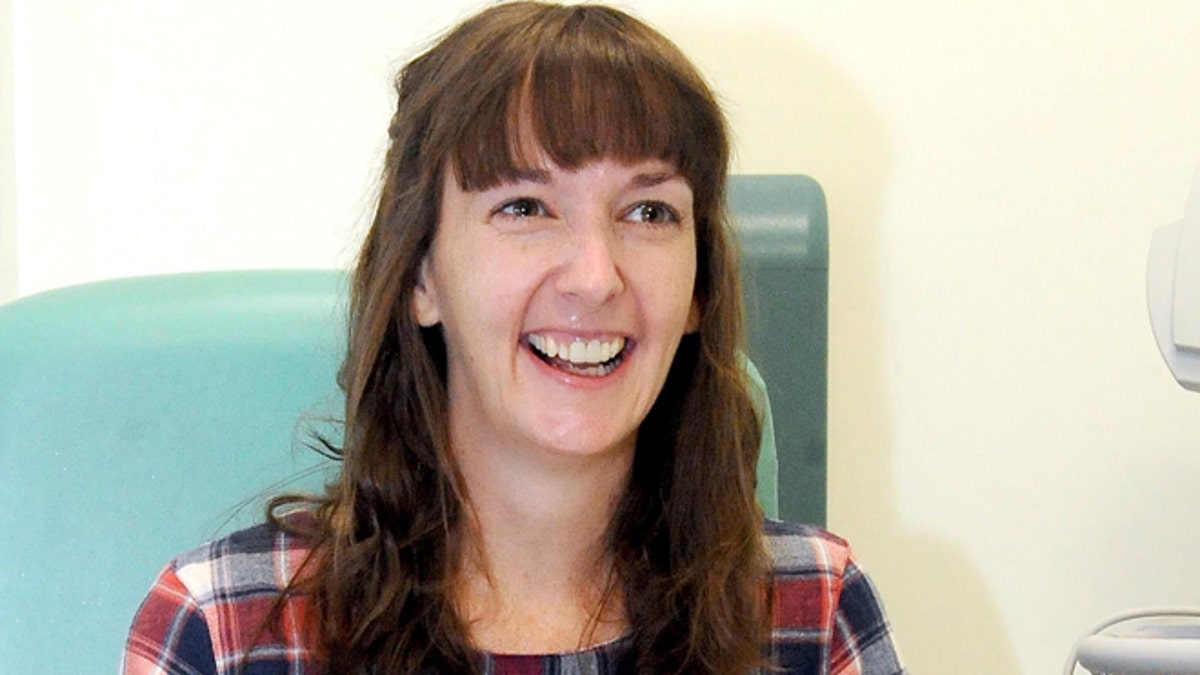
In this file photo, Pauline Cafferkey, a nurse who contracted Ebola while working in Sierra Leone, smiles in the Royal Free Hospital in London. (AP)
LONDON – The World Health Organization says it's possible in rare instances for patients who survived Ebola to develop the lethal disease again, when the virus lingering in the body starts to replicate at high levels.
That might explain what has happened to a Scottish nurse now being treated in London's Royal Free Hospital. Pauline Cafferkey was admitted Friday for an "unusual late complication" of Ebola after having recovered from the disease in January, the hospital said. On Wednesday, it said Cafferkey was critically ill after her condition deteriorated and that she was now suffering from Ebola, not just a complication.
WHO spokeswoman Dr. Margaret Harris said Thursday that the U.N. health agency has heard of several similar cases, although they are not well documented.
"What we have seen is that in some people, the virus lies dormant at a site and then for some unknown reason, starts to reproduce again," she said. "We think it's a minority of people, otherwise we would have seen cases all over the place."
Harris said it's unclear whether those people might then be infectious to others. British tabloids made much of the fact that Cafferkey was photographed standing near the prime minister's wife recently after accepting an award in London.
To date, Ebola has killed more than 11,000 people in West Africa and left some 17,000 survivors in the region, many of whom have poor access to health care.
Harris said a significant number of recovered Ebola patients are still suffering ill effects from the virus. In some areas of Sierra Leone, half of the Ebola survivors have serious eye problems that only developed after they were discharged from the clinic, she said.
"We still have very little information about the impact of Ebola lingering in the body at different sites," she said, noting it was unclear whether the persistent virus might be responsible for survivors' ongoing medical problems or if those can be attributed to the acute illness that patients recovered from months earlier.
Scientists say the Ebola virus can sometimes hide for months in parts of the body not covered by the immune system but acknowledged that Cafferkey's case was unusual.
"Pauline seems to be an anomaly," said Dr. Nathalie MacDermott, a clinical research fellow at Imperial College London. "Everything we know about Ebola suggests there are long-term effects but not necessarily any that are life-threatening."
MacDermott hypothesized that Cafferkey's relapse might have been triggered by her immune system.
"If the immune system is distracted, say by fighting off another infection, that might give the virus a foothold to start replicating again out of control," MacDermott said. "It is unusual that it would be able to spiral out of control and (produce) an acute infection again but it's not impossible."
MacDermott said other diseases like herpes also recur when a person's immune system is weakened, and said it was possible that similar cases to Cafferkey's were going undetected in West Africa.
